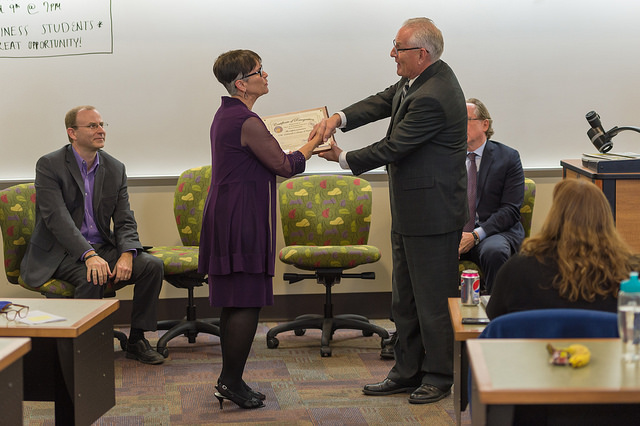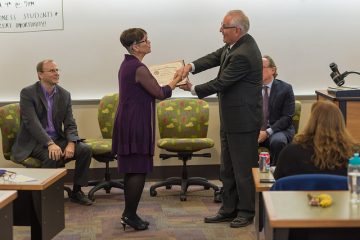The University of Wisconsin Oshkosh College of Nursing has earned an award of distinction for its exceptional pass rate to license new nurses.
Secretary Dave Ross of the Wisconsin Department of Safety and Professional Services (DSPS), presented College of Nursing (CON) Pre-licensure Program Director Suzanne Marnocha with a plaque to recognize the extremely high student pass rate of 96.45 percent in 2015 on the National Council (of State Boards of Nursing) Licensure Examination (NCLEX) for first time applicants.
“You have one of the highest pass rates in the state,” Ross said. “This is incredible.”
He said the stellar scores speak to the quality of education taking place at UW Oshkosh.
Provost and Vice Chancellor for Academic Affairs Lane Earns said the distinction from DSPS is a testament to the strides made by the College of Nursing over the past decade.
“Congratulations on your award,” he told a roomful of mostly graduate-level students and several instructors. “It is richly deserved.”
Marnocha said UW Oshkosh students, for more than 10 years, have consistently exceeded the national pass rate of 89 percent for all first time applicants for the NCLEX.
“We are one of the largest producers of BSN graduate nurses in the state each year,” she added. “Each year we have in excess of 200 first-time applicants sitting for the NCLEX.”
 Ross, who told students about his four daughters who are in various roles in the nursing field, said it was great to be on campus with “so many high achievers.”
Ross, who told students about his four daughters who are in various roles in the nursing field, said it was great to be on campus with “so many high achievers.”
Ross was introduced by CON Dean Leslie Neal-Boylan. He informed the group of students in the room that they will be among the approximately 105,000 nurses in Wisconsin to be issued a license every two years. The nursing profession far-outnumbers the next highest group of licensed professionals in Wisconsin: beauty professionals and cosmetologists who number 55,000.
Ross led a talk and took questions about new rules and procedures related to the prescribing of prescription drugs—particularly opioids. He was joined by Greg Gasper, division administrator with the DSPS division of management services.
“During the 90s, there was a push to relieve all pain,” Ross said about the increased prescribing of opioids for pain management. “Pharmaceutical folks were saying (use of synthetic compounds) is a safe, non-addicting way.”
Studies found that patients required an escalating dose to find relief of long-term chronic pain. Health care professionals now are being told opioids should not be the first-line of defense.
The discussion Tuesday with UW Oshkosh nurses focused on the importance of the Prescription Drug Monitoring Program, as well a new requirement for continuing education related to opioid prescribing guidelines.
A drug monitoring program was created to curb opioid addiction—a serious concern in Wisconsin and across the U.S. Authorities say opioid users often turn to heroin when their prescriptions run out.
Learn more:


